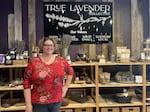
True Lavender Collective in downtown Ashland.
James Kelley / Jefferson Public Radio
An iconic lavender store in Ashland faced an unexpected hurdle earlier this year when its supplier mysteriously closed up shop.
Julie Harden had owned Pelindaba Lavender in Ashland for five years.
Her store could be recognized by its deep purple paint job and the lingering floral scent that wafted down the street.
It was a franchise of Pelindaba Lavender, a beloved farm in the San Juan Islands in Washington State.
One afternoon in late January, Harden was driving back from an appointment at the DMV when she got an unusual phone call.
“I finally get into the car, dial into the call, and then hear the farm is closing,” Harden said. “They’ve told the employees they have until Feb. 8 to return their laptops and are not allowed to go into the facilities.”
The farm had become a popular destination on the islands in its more than twenty years in business. It also distributed products and ingredients to Pelindaba Lavender stores in Oregon, Washington, Texas, Georgia and Florida.
Calling from across the country, the store owners began piecing it all together. They realized they were thousands of dollars short on pre-ordered supplies.
Harden’s first thought—what does this mean? She wondered why the franchisor and owner of Pelindaba Lavender, Stephen Robins, had not alerted the franchisees about the farm’s closure.
“To go from dictating the length of a piece of Scotch tape that we could use to put a sign on the front door to suddenly shutting down the website with no word was very uncharacteristic,” Harden said.

True Lavender Collective, formerly Pelindaba Lavender, in downtown Ashland.
James Kelley/Jefferson Public Radio
Aimee Hauff used to own a Pelindaba Lavender franchise in Edmonds, Washington. She said Robins alerted the store owners to a press release in July 2023, where he said he was putting his farmland on the market as part of a “strategic operation.”
“He explained, ‘I’m basically going to get the money out of my land,’” Hauff said. “It’s going to be like an investment property—the buyer is going to lease it back to the Pelindaba LLC and it would be a technical business transaction, where they were an investor, but he would get it leased back to him.”
Hauff, who has a background in real estate, was skeptical of the decision to sell the farmland.
The store owners urged Robins to provide more explanation. Instead, Robins said he was confused at the request.
“Both the content and manner of both questions are more than a little disconcerting,” Robins said, when asked by the store owners in an email about whether he was being honest with them about the farm’s financial situation. “Hopefully as you absorb my responses and we progress with our relationship, there will be less reason for such concerns to arise, let alone be expressed in this way.”
Contrary to Robins’ statements, San Juan County court records show allegations he was behind on payments for a series of loans that he had taken out between 2012 and 2019 from Banner Bank.
According to court records, he allegedly used accounts, inventory, personal property and life insurance policies as security and extended the maturity dates on all of the loans multiple times, until “all sums became due and owing” in April 2023.
Ultimately, the bank alleges Robins was more than $3 million in debt. A month later, the bank filed a complaint against him, moving to foreclose on his properties.
Both Harden and Hauff confirmed the store owners were not apprised of the farm’s financial situation during their time in business with Robins, although the court documents were public.
Robins did not respond to multiple requests for comment. His lawyer also declined to comment.
Hauff said Robins still has not spoken to the store owners.
“He hasn’t spoken to us or outright admitted the wrongdoing that he has done,” she said. “Even if it was just a personal note that just apologized, it wouldn’t make it better because I’m still out the money, but it would at least show me that he’s acknowledging that he’s done something wrong.”
Communication ended between the store owners and Robins in early January, according to Hauff. Three Pelindaba stores shut down. Then, the farm made an Instagram post in March announcing its closure, tagging the four surviving franchises.
“It made it just sound like it was kind of planned, and it was not a big deal,” Hauff said about being tagged in the Instagram post. “And really, in the background, it was all B.S., because none of us knew.”
Harden said she and the owners were simultaneously faced with a decision—they could either shut down their shops, some of which were six or seven years old, or try to rebrand, an expensive and time-consuming process.
“You don’t have a lot of money at that point,” Harden said. “And then you’re sitting there going, ‘Hey, I’m owed like $13,000. That’s pretty much what we’re going to need to rebrand.’”
Harden said that money never came. But since she had just enough inventory to stay open during the months after the farm closed, she started looking at new lavender suppliers and began sourcing products.

Julie Harden at True Lavender Collective in Ashland.
James Kelley/Jefferson Public Radio
“I had enough knowledge with some of our local farms here, and had already built relationships with them,” Harden said. “Being able to pick and choose the finished products that they might have, or the raw ingredients that they might have, has really been the trick.”
Harden changed the name of her store from Pelindaba Lavender Ashland to True Lavender Collective. She said the name is representative of her vision of showcasing the best lavender that Oregon has to offer, across different local farms and brands.
After many months, she is still left guessing about why Robins hasn’t communicated with her.
“I think in the end, he was embarrassed and in denial that this was happening, and probably couldn’t face it,” she said.
As for the farm, a summary judgment hearing is set to take place Sept. 17, according to the San Juan County clerk, which will determine what happens to the once-fragrant Pelindaba Lavender farmland.